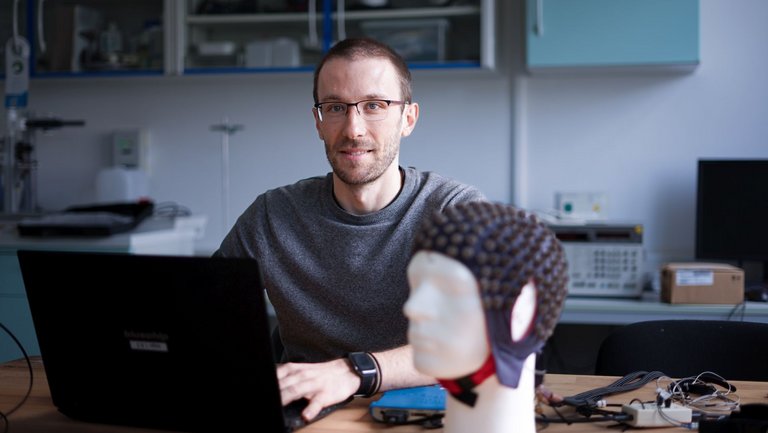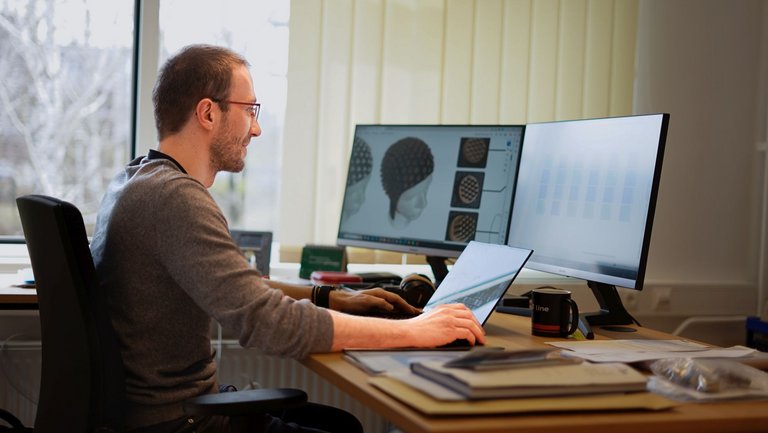Prof. Patrique Fiedler and his team at the Institute of Biomedical Engineering and Informatics (BMTI) at TU Ilmenau are working on a space-qualified EEG system in cooperation with the US space agency NASA. It is intended to accompany astronauts on long-term missions in order to recognize limitations in their performance in good time and to be able to counteract them.

Water, metals and rare earths - valuable raw materials such as these are becoming increasingly scarce on Earth. In space, on the other hand, researchers believe they are found in large quantities. Ores such as silicon, aluminum and magnesium have already been discovered on the planet Mars. In the "Mars Exploration Program", the space agency NASA is planning manned flights to Mars with the prospect of mining raw materials there in the future. This requires capable astronauts. For them, being in a spacecraft is a mental and physical strain. Studies have shown that their cognitive performance decreases, especially over longer periods of time.
In a current research project, scientists at TU Ilmenau are developing a spaceship-compatible EEG system to measure brain activity. In collaboration with the Complutense University of Madrid and McGovern Medical School Houston, both the technology and the methodology for the automatic analysis of brain activity during space missions are being researched as part of a NASA grant from the Translational Research Institute for Space Health (TRISH). During upcoming NASA space missions, astronauts will use the system for several hours every day in order to detect and counteract declines in performance in good time.
Prof. Patrique Fiedler, Head of the Data Analysis in Life Sciences Group at TU Ilmenau, and his partners analyzed several EEG data sets from astronauts after they had returned to Earth. It was already known that being in space had negative effects on their cognition, perception and mental processes. However, Prof. Fiedler and his team are currently investigating what is known as recovery in particular and, building on this, want to develop procedures to slow down the decline in performance and achieve recovery during the mission in future, if possible. Prof. Fiedler explains:
The negative effects could be demonstrated in all space travelers. The physical and mental stress, the low gravity, the noisy environment and possibly also the radiation are probably responsible for the fact that they do not have proper relaxation phases and their performance decreases, especially on long missions.
An EEG system based on dry electrodes developed at the TU Ilmenau is intended to provide a remedy. In order to measure brain signals, the electrodes are attached to a cap. The wearer puts it on like a cap and can carry out their activities without any restrictions. This is made possible by dry electrodes which, unlike conventional medical measuring devices, ensure measurements between the skin and the electrode even without gel. The hood was developed by Prof. Fiedler as part of his doctoral thesis at the Institute of Biomedical Engineering and Informatics (BMTI) and is already available on the market. In the current research project in cooperation with NASA, the scientists at the BMTI are going one step further: they are optimizing the measuring system designed for medical diagnostics for diagnostics and monitoring for space travel:
We are developing a particularly lightweight, comfortable and easy-to-use measuring system that is adapted to the needs of space travel and can withstand the conditions in the spacecraft as well as the extreme acceleration during take-off and landing of the spacecraft. It will also be energy-efficient, which is why the power supply is already integrated into the system.
The cap not only serves as a measuring system in space, but also as a medical diagnostic device. The EEG data is sent to NASA, where doctors diagnose the health of the space travelers and recommend therapeutic measures, according to the scientists' idea. The project is also conducting research into this. The team is focusing primarily on neurofeedback - a form of therapy that has already proven successful as a component in the treatment of ADHD, for example. The therapy is a form of computer-assisted brain training and focuses on actively influencing brain activity. Patients consciously control their brain functions in a playful way by relaxing or concentrating, thereby increasing their ability to concentrate, remember or relax through simple exercises. According to Prof. Fiedler, this approach is also promising for space travelers to reduce stress and relax despite the exceptional situation in space.
A first prototype of the EEG cap is currently in Houston. Prof. Fiedler is working hard to complete his system for future NASA space missions. With his research, he wants to make a contribution to the exploration of space:
Astronauts need to maintain their health, especially during long-term missions in space. This can be achieved with our practical system for measuring performance in combination with therapeutic approaches.
Contact us
Prof. Patrique Fiedler
Head of the Data Analysis in Life Sciences Group


